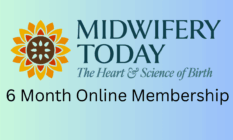
Photo by Ignacio Campo
Traditional Midwifery, The Traditional Way
Midwifery Today, Issue 145, Spring 2023.
Join Midwifery Today Online Membership
A long time ago in a galaxy far, far away, I was taught the art and craft of midwifery through study, apprenticeship, and mentoring. It was the mid-1980s, and the landscape of birthing in America was quite different than it is now.
One of the fascinating things about birth (undisturbed, physiological birth) is that it never changes. Not through the decades, centuries, or millennia of human existence. Birth, itself, does not change. The birthing landscape, however, does change, and radically at that.
With the changes that have taken place in that landscape over the past 40 years, the way of “training” midwives has changed as well. And some of those changes in “midwifery education” have, I believe, left behind the most essential aspects of what is required to be nurtured into becoming a midwife. The very terms “training” and “midwifery education” are reflections of this change.
The voice and methods of patriarchal culture are ubiquitous. We are fish swimming in patriarchal waters, whether we are aware of the water or not. The modern institutions of politics, education, and medicine were created by and for men, and continue to be dominated by the patriarchal world view today. Midwifery, an art and craft conceived by and for women, has been reshaped with the effort to become approved, respected, and ratified by these patriarchal institutions.
Where has this gotten us in the past four decades? More autonomy? More respect? More agency? No. Just the opposite, in fact.
I share these observations by means of an introduction to how I was called to create a school of traditional midwifery and why we are meeting in a small cohort, hands-on, in real time and space.
One of my own beloved mentors, Valerie El Halta, would often say that we should “choose our teachers and mentors wisely, because we will become like them.” Intrinsic to this statement is the understanding that becoming a midwife is much more than the skills we are taught. There is something deeper that is passed on from mentor to student: the heart of midwifery, the actual way of being that is at the core of how a midwife moves in the world, and the way that she interacts with mothers, babies, families, and communities.
This “something deeper” stands at the center of Sophia’s Circle School of Traditional Midwifery.
In my understanding, traditional midwifery is best taught in the traditional way: with mentors who know and love you, in real time and space, and in a circle with your sister midwives.
I have shared with my students in Sophia’s Circle that I am modeling all the time. Everything I say or don’t say, do or don’t do, is intentional. I am midwifing my students! Teaching them about how to create and hold safe space is done while creating and holding safe space. Teaching the core qualities of midwifery care (love, courage, humility, intuition, authenticity, respect, service) is done while providing that kind of care for them. I refer to these as the soft skills of midwifery … the ones that enable us, as midwives, to practice the hard skills with gentleness, wisdom, and integrity.
Midwives are more, much more, than birth “practitioners” or “providers.” We stand at the threshold of transformation, where women give birth to their babies and to themselves. It is sacred ground.
Are the hard skills important? Of course! Yet even here, how we are taught matters. Having been apprenticed and mentored by many beautiful elder midwives, I can attest that they have attended every birth with me over the past four decades. Their wisdom and instruction (often heard in my mind in their own voices) supported me throughout the life of my practice. My words were guided by their words and my hands were guided by their hands. My gratitude to them is neverending.
Another aspect of passing on traditional midwifery the traditional way, is what the students in Sophia’s Circle call “learning at the feet of the elders.” At 64, I am a young crone. On my 60th birthday, I gathered my three closest friends for a crone crowning, and with trembling hands I accepted the call to become an elder within my beloved tribe.
The women who responded to the call to join Sophia’s Circle were seeking that. Having taken many other courses and workshops, and having participated in other schools and programs, they still felt that something was “missing.” In their words, they wanted to “learn at the feet of an elder.”
Learning in community with your sister midwives is also crucial to traditional midwifery formation. In our current birth climate, competition, gossip, and lack of support plague many communities of midwives. Peer review (essential to the safe practice of autonomous midwifery) is rarely practiced, because of the hostility that exists among midwives. Many midwives find themselves without support. This is unsafe for everyone.
In Sophia’s Circle, every woman in the cohort is valued and supported. Sharing, respecting, and learning from each student’s unique gifts, perspectives, and offerings is built into our two-year program, encouraging the formation of deep and lasting friendships. We are a safe circle in which to explore and forge relationships with woman.
Now, let me say clearly that there are many different women looking for many different kinds of midwives, and there are many different programs and schools to prepare those midwives in many different ways. I am glad they all exist!
I don’t believe that Sophia’s Circle is necessarily the “best” or only way; rather it is a way that I believe is important, and has become rare in a world of Zoom classes and drop-down quizzes. Midwifery is a hands-on, heart-first calling … somewhere along the way, we need something of that in our formation. Sophia’s Circle holds this at its center.
As all of us navigate a world that has become (and is becoming) increasingly driven by technology, I invite you to consider deeply the ways in which you are teaching and/or learning the ancient art and practice of midwifery. Our ancestresses as well as the next generation of midwives, mothers, and babies are counting on us.
Blessed be.

 Lois Wilson has been serving women and families as a midwife, teacher, activist, and advocate since 1986. She believes that birth is a sacred and natural event and that all birthing families deserve the very best support. She also believes that we should choose our teachers and mentors wisely because we will become like them. Lois is the founder and director of True Heart Birthing, a mentoring program for new and aspiring midwives, doulas, and birthworkers that is set apart by our deep faith in natural and undisturbed birthing and our belief that a hands-on, mentoring approach to learning the art, heart, and skills essential to your practice is far superior to institutional and online learning. Lois is committed to keeping the true heart of birthing alive and thriving, and passing it on to the next generation.
Lois Wilson has been serving women and families as a midwife, teacher, activist, and advocate since 1986. She believes that birth is a sacred and natural event and that all birthing families deserve the very best support. She also believes that we should choose our teachers and mentors wisely because we will become like them. Lois is the founder and director of True Heart Birthing, a mentoring program for new and aspiring midwives, doulas, and birthworkers that is set apart by our deep faith in natural and undisturbed birthing and our belief that a hands-on, mentoring approach to learning the art, heart, and skills essential to your practice is far superior to institutional and online learning. Lois is committed to keeping the true heart of birthing alive and thriving, and passing it on to the next generation.



















